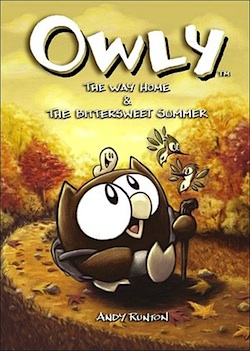The first collected volume of Andy Runton’s all-ages comic Owly, “The Way Home & The Bittersweet Summer,” was released in 2005, but I ran into it much more recently than that—I snagged copies of this first volume and the third volume at a used bookstore, because the sight of that adorable owl-face with the little fluttery hummingbirds on the cover filled me with an indescribable joy. (To be honest, I may have actually clapped my hands with delight.) The series has garnered creator Andy Runton an Ignatz Award for Promising New Talent and two Eisner Award nominations with one win for “Best Publication for a Younger Audience.”
This comic is also so cute and so fun that I had to write about it and share the love.
On Runton’s website, there are lots of free Owly minicomics for the curious reader, but this first volume is an excellent introduction to the stories of “a kind-hearted little owl who knows what it means to be human.” The tales are told without dialogue; the images alone carry the day, and carry it well. While these are all-ages comics written for children, I found the art intriguing for its evocative simplicity—it’s the sort of thing that reads easily, but can’t have been easy to actually do.
“The Way Home,” the first story in the book, introduces Owly’s friend, Wormy. At first Owly is dejected because the other critters are frightened of him—the birds he tries to feed run away in a panic when he pops out of a bush, the lightning bugs he releases from a jar run away, etc. But, during a storm, he sees a little worm drowning in a puddle, rescues it, takes it home, and nurses it back to health. Then the worm tells Owly about his missing parents, so they undertake a trek to find them again. Wormy is reunited with his parents, who are afraid of Owly at first, but Wormy introduces them all. Owly bids them adieu, and is sad—but Wormy follows him, and they go away to live together and be friends.
That simple summary doesn’t quite convey the sweetness and sorrow that Runton manages to imbue his illustrations with. The message of the story is plain—don’t judge a book by its cover; Owly may be an owl, but he’s kind-hearted and would never hurt another bird or his worm friends—but, inundated by the harshness and bitterness of some of my other favorite comics Well, it’s nice to read something that’s pleasant and meaningful.
The art, too, is remarkably enjoyable, especially for folks who love birds and/or general cuteness. Details like Owly’s lowered eyelids and slumped walk as he goes to refill the bird feeder once the little birds have flown away in panic are simplistic but effective. The round, soft details of the surroundings, Owly’s form, and the expression-bubbles create a homey, welcoming atmosphere—all the more upsetting when it’s lashed with rain and the dark of night. The only words in this first novella are sound effects, but the entire narrative comes across clearly through the illustrations. I’ve heard the wisdom that a good comic artist can tell the whole story without words from a script, and Runton certainly fulfills that stricture. The second story does contain some text, but still no dialogue; it’s a more complicated story, but once again, the art tells it effortlessly. Runton’s skill for decanting a great deal of emotion, narrative, and detail into these streamlined panels is impressive.
In that second story, “The Bittersweet Summer,” Owly and Wormy meet a pair of hummingbirds, buy the right kinds of nectar flowers to feed them, and rescue one from a human who captures it—but then winter comes. They try to make the hummingbirds tiny scarves, but that doesn’t work; they try to bring the flowers inside, but they wilt. The hummingbirds leave, and Owly is upset, but then Wormy finds information in their bird-watching book: hummingbirds ae migratory, and they’ll be back! The story ends the next summer, with the hummingbird pair returning.
As I’ve said, it’s simple but meaningful, and genuinely heart-warming. Owly’s face is amazingly expressive, considering that Runton draws him as a small round body with round eyes; the hummingbirds, with their sketchy wings and smiling tiny faces, are so adorable as to be nearly painful to look at. This comic prompted more murmurs of delight and enjoyment from me as I read it than anything has for a long while.
There’s worth in sweet, emotional stories of friendship, growth, and the real beauty of the natural world. Andy Runton’s Owly is a new favorite of mine—it’s a breath of fresh air, an uplifting comic about a sympathetic, occasionally hapless, big-hearted owl that can’t quite fly. I’d highly recommend it to readers with children to share together, but even as an adult, I loved reading Owly’s stories. Owly satisfies me as a bird-watcher and a fan of cute things, a reader of comics and a seeker of lovely art. Go read it; you won’t regret spending a bit of your day following these tales of bird-friendship.
Lee Mandelo is a writer, critic and occasional editor whose primary fields of interest are speculative fiction and queer literature, especially when the two coincide. Also, comics. She can be found on Twitter or her website.










